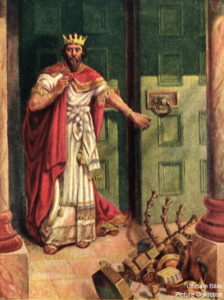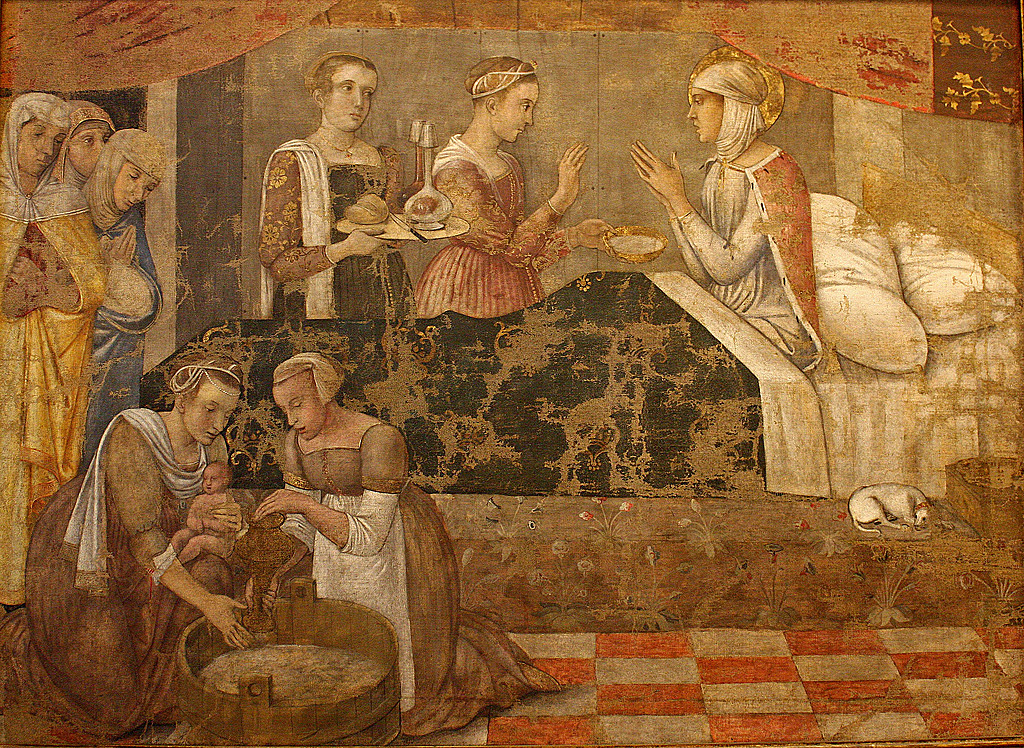In a post called “Atheists don’t study the bible,” Ray Comfort* rebuts an “infamous mistranslation” of Isaiah:
Carl, Isaiah 7:14 says “Therefore the Lord himself shall give you a sign; Behold, a virgin shall conceive, and bear a son, and shall call his name Immanuel” (italics added). If the word “virgin” had been mistranslated and should rather have read “young maiden,” then that wouldn’t be a “sign” from God. Every day, thousands of young maidens conceive. Only once has it happened to a virgin.
We’ve all seen the above argument dozens of times: Isaiah told us to look for a virgin birth as evidence of the coming Messiah, and Jesus fulfilled that. We might even have used it without really looking it over. But we need to dig deeper, as even though Jesus was born of a virgin, this was not primarily what Isaiah was prophesying.

Ahaz, King of Judah during the late the 8th century bc, was being attacked by the nations of Aram and Israel and was considering appealing to the Assyrians for military assistance. The prophet Isaiah urged him to ask for a sign from God that things would work out for Judah’s best. Ahaz refused, at which point Isaiah, frustrated, gave this prophecy:
Therefore** the Lord himself will give you a sign; Behold, a virgin will conceive and bear a son, and she will call his name ‘Immanuel.’ The child will eat butter and honey when he learns how to refuse evil and choose good. But before the child learns to refuse evil and choose good, the land that you hate will lose both her kings.
— Isaiah 7:14-16 (my translation with help from King James)
You may recognize the first sentence, it’s the Virgin Birth prophecy that Comfort refers to. But what’s the rest of this? Its words are plain enough: a young child is going to be born and before he’s old enough to know right and wrong, maybe three years, both of Ahaz’s tormentors would be dead.
The prophecy was given to Ahaz, at a specific time and for a specific purpose: he was to rely on God rather than on Assyrian arms, because his tormentors were temporary while the damage he could cause his kingdom would be permanent. In its immediate application, it’s not remotely messianic except in the sense that God would deliver Judah (Immanuel means “God is with us”). Reading the whole passage, it’s difficult not to conclude that whatever sign this was to be, it applied primarily to the 8th century bc and would be fulfilled then. Otherwise the passage as written and the promise as given make no sense: what help is it to Ahaz’s tenuous military situation that Jesus would be born 700 years hence?
What is the specific “sign” that Ahaz was to receive from God? Would it be that a virgin gave birth? It can’t be, because Comfort correctly assures us that that’s only happened once. Would it be that a young woman had a child? Nope, Comfort correctly notes that they have kids all the time. I submit to you at that the young woman and child is not the sign at all. The sign is that both kings would die, meaning that Ahaz had no need to seek outside military help***. The inclusion of the woman and child is but a dramatic way of telling Ahaz when that would sign come to pass. The only way we can possibly attribute this to Jesus — born 700 years after Ahaz, Isaiah, and both of the hostile kings were dead — is because Matthew told us it was.
That being the case, I doubt that the virgin birth is meant to be a sign for us at all. While Matthew says it was done so what Isaiah said “might be fulfilled,” he does not say that it’s being done as a sign for us. He purposely leaves that part of the passage out of his gospel. If the Virgin Birth is supposed to be a sign for us, it’s of questionable utility to us anyway: no one but Mary was in a position to absolutely verify it.
Matthew was surely correct****: God kept his promise of a Messiah to Israel through the Virgin Birth of Jesus Christ. But because none of us understands very well how exactly God went about that, we need to recognize the limitations of our own interpretations before we criticize others who find those interpretations unpersuasive.
* Yeah, the banana guy. I actually think the banana argument from design is one of the sillier arguments for creationalism that I’ve seen, if only because modern bananas are a result of thousands of years of human domestication and cultivation. Wild bananas don’t look like the ones you buy in the store, so it’s a little tough to argue that God created something because it’s convenient to us, when it’s convenient to us mostly because we have bred it to be so.
** The opening “therefore” refers to Ahaz’s intransigence.
*** which he eventually did anyway (2Kings 16:7). It turned out to be a very bad idea in retrospect.
**** The New Testament authors’ interpretive approach was common in 1st Century Judaism – using small snippets and key words to “illustrate” later events. That would look uncomfortably subjective were some person to do it today. I accept that they are correct because I have a prior acceptance of the New Testament as inspired. But that’s not how we “do” prophecy in the 21st century.










El Borak, are you familiar with Michael Heiser? He is the only person that I have heard recently making that same point recently about the prophecy in Isaiah. If your not, I would recommend checking his work out, it’s quite valuable